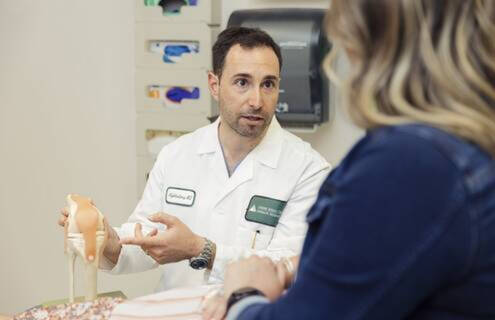
The whole point of a prevention program is that it's easy for anybody to do. Typically, the program doesn't need to last more than 20 minutes and only needs to be done two to three times a week.
Neal B. Goldenberg, MD, MAMost K-12 students in New Hampshire will have their winter break from February 26-March 1 this year, and many Granite State families will use that time to hit the slopes. Skiing and snowboarding is a great way to get outside and enjoy the season here in northern New England, but like any sport, it comes with risk of physical injury, especially if you don’t prepare your body ahead of time.
One common—and also painful and debilitating—injury caused by skiing and snowboarding is tearing of the anterior cruciate ligament, or ACL. “What happens is the tibia, or the shin bone, moves forward in relation to the femur, tearing the ACL,” said Neal B. Goldenberg, MD, MA, an orthopaedic surgeon and chair of sports medicine at Dartmouth Health’s Cheshire Medical Center. “Often, this happens when the knee is no longer directly above the toes. So, if you think about the position of someone cutting, and they're more kind of ‘knock-kneed’ at that time, they’re at higher risk for an ACL injury.”
By working on strength, balance, plyometrics and body awareness, people can guard against possible ACL tears, Goldenberg said. Starting these exercises a week or two before a planned ski trip is ideal, but starting even a few days ahead has benefits. Here are some exercises to consider, courtesy of the Multicenter Orthopaedic Outcomes Network Knee Group, with modifications available to best suit your level of fitness:
Strength:
- Plank (push-ups)
- Level 1: Both legs
- Level 2: Alternate legs
- Level 3: One leg lift
- Side plank
- Level 1: Static
- Level 2: Dynamic
- Level 3: With leg lift
Balance:
- Single-leg balance
- Level 1: Hold the ball
- Level 2: Throwing ball with partner
- Level 3: Test your partner
- Level 4: Throwing ball with partner on wobble-board
- Level 5: Test your partner on the wobble-board
Plyometrics:
- Squats
- Level 1: With toe raise
- Level 2: Walking lunges
- Level 3: One-leg squats
- Level 4: Squats with toe raise on wobble-board
- Level 5: One-leg squats on wobble-board
Jumping:
- Level 1: Vertical jumps
- Level 2: Lateral jumps
- Level 3: Box jumps
- Level 4: One-legged jumping sequence
- Level 5: Box jumps with partner
Running exercises:
- Running over a field – If you’re rehabbing after ACL surgery, you’ll begin walking on smooth surfaces before advancing to jogging and running and then on grass or other uneven surfaces.
- Bounding run (basically high knee skipping)
- Running and cutting
- Running through a course
- Hip out
- Hip in
- Circling
- Running and jumping
- Quick run
“It doesn’t need to be a very long or intensive routine,” Goldenberg said. “The whole point of a prevention program is that it's easy for anybody to do. Typically, the program doesn't need to last more than 20 minutes and only needs to be done two to three times a week.”
About Cheshire Medical Center
Cheshire Medical Center (Cheshire) is a Dartmouth Health member providing the communities in the Greater Monadnock Region a continuum of care spanning primary care and specialty medicine, to surgical services and acute inpatient care. For more than 130 years, Cheshire has been a key contributor to the health and vitality of the Monadnock Region. As a not-for-profit community medical center, Cheshire is deeply committed to delivering excellent care in a safe and welcoming environment. Cheshire is dedicated to being a great neighbor and serves as an integral community resource. Cheshire is the area's largest healthcare provider and leading employer. Along with the services delivered on their Keene campus and satellite locations, the Medical Center partners with local organizations to provide vital services and programs throughout the region. To learn more, call 603-354-5400 or visit the Cheshire Medical Center website.
About Dartmouth Health
Dartmouth Health, New Hampshire’s only academic health system and the state’s largest private employer, serves patients across northern New England. Dartmouth Health provides access to more than 2,000 providers in almost every area of medicine, delivering care at its flagship hospital, Dartmouth Hitchcock Medical Center (DHMC) in Lebanon, NH, as well as across its wide network of hospitals, clinics and care facilities. DHMC is consistently named the #1 hospital in New Hampshire by U.S. News & World Report, and is recognized for high performance in numerous clinical specialties and procedures. Dartmouth Health includes Dartmouth Cancer Center, one of only 57 National Cancer Institute-designated Comprehensive Cancer Centers in the nation, and the only such center in northern New England; Dartmouth Health Children’s, which includes the state’s only children’s hospital and multiple locations around the region; member hospitals in Lebanon, Keene, Claremont and New London, NH, and Windsor and Bennington, VT; Visiting Nurse and Hospice for Vermont and New Hampshire; and more than 24 clinics that provide ambulatory and specialty services across New Hampshire and Vermont. Through its historical partnership with Dartmouth and the Geisel School of Medicine, Dartmouth Health trains nearly 400 medical residents and fellows annually, and performs cutting-edge research and clinical trials recognized across the globe with Geisel and the White River Junction VA Medical Center in White River Junction, VT. Dartmouth Health and its more than 13,000 employees are deeply committed to serving the healthcare needs of everyone in our communities, and to providing each of our patients with exceptional, personal care.